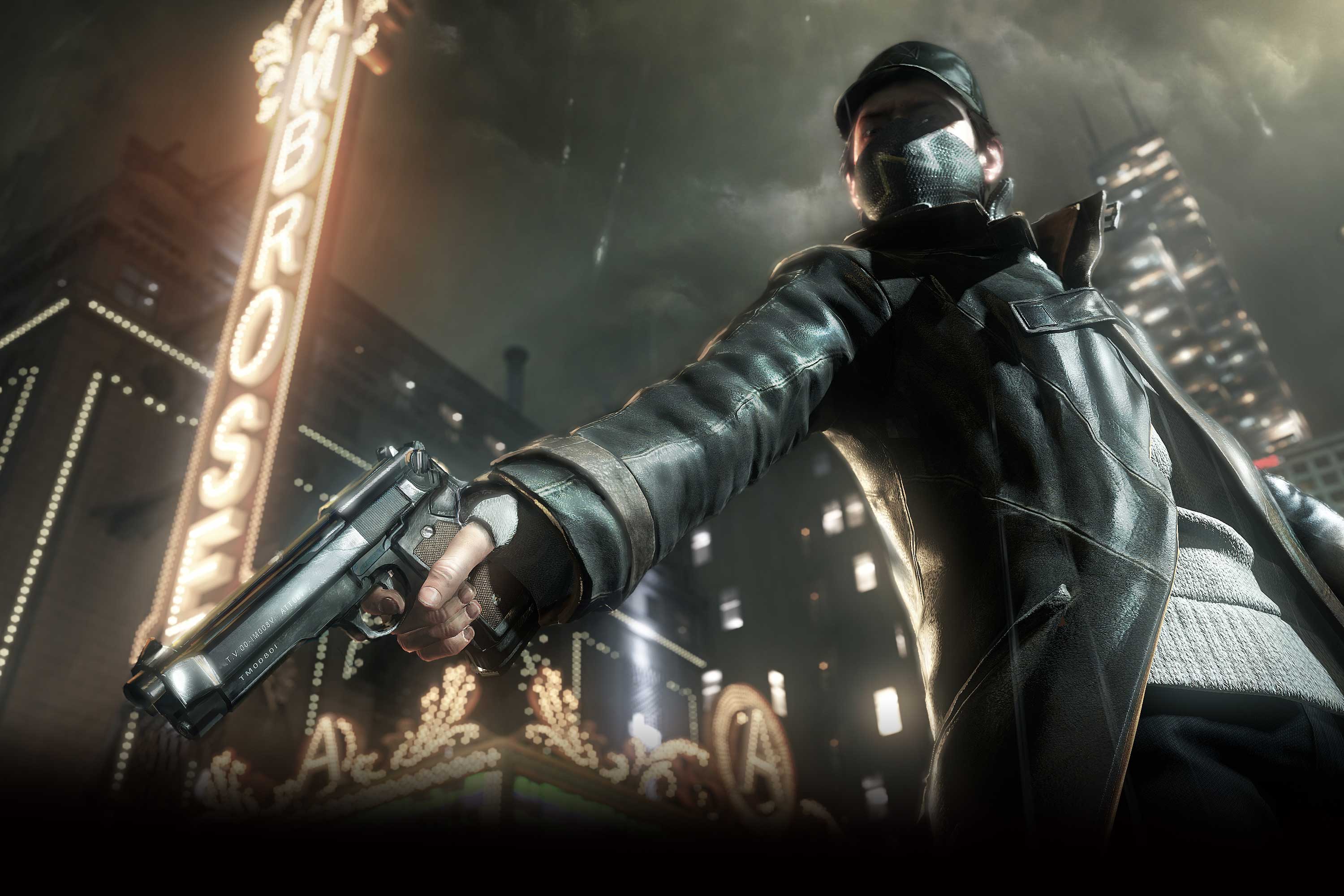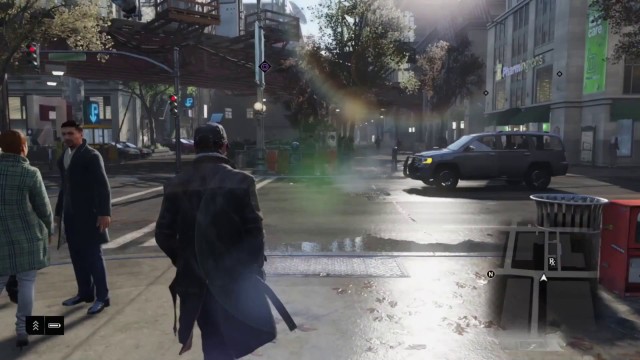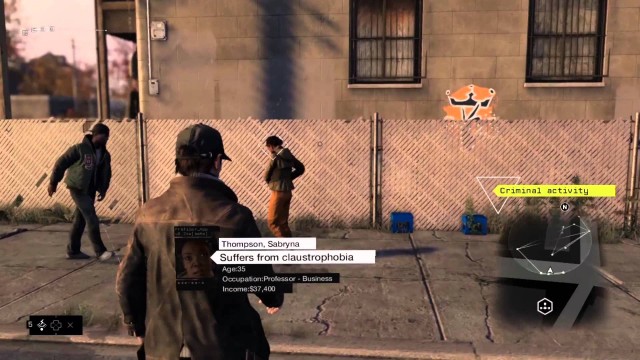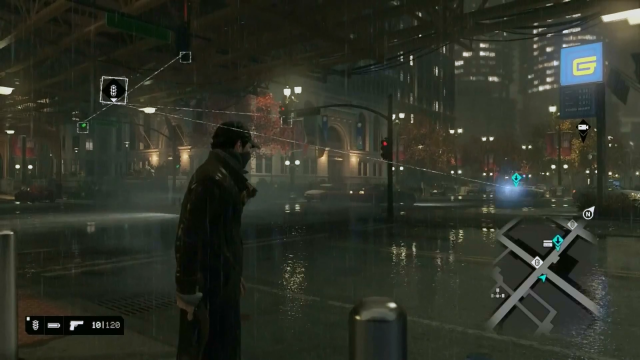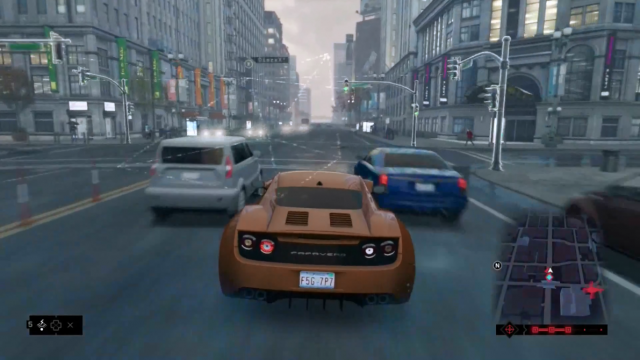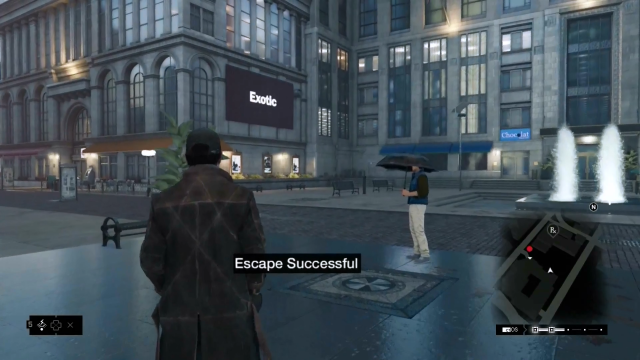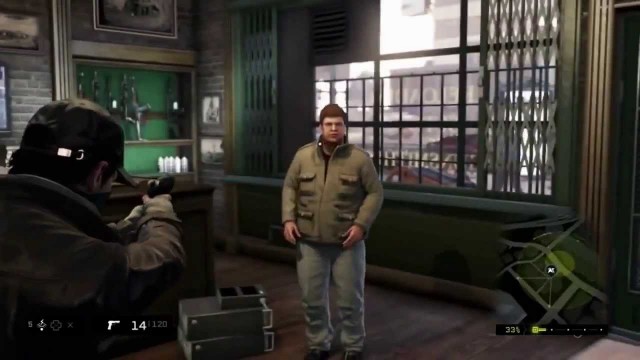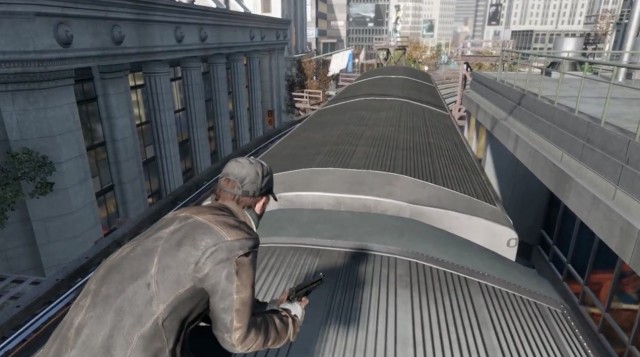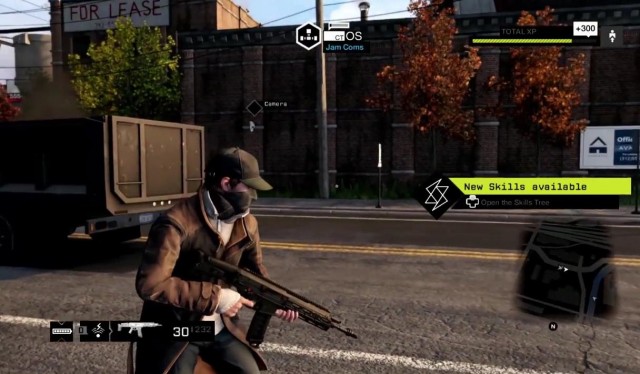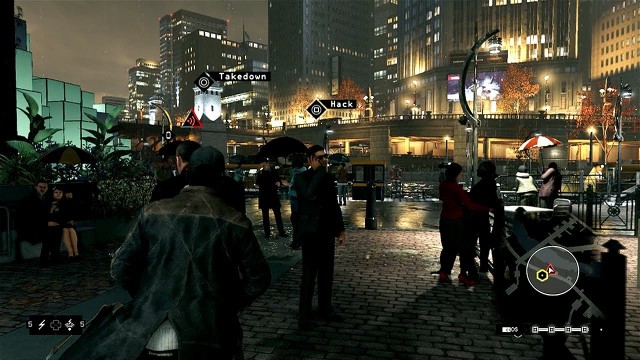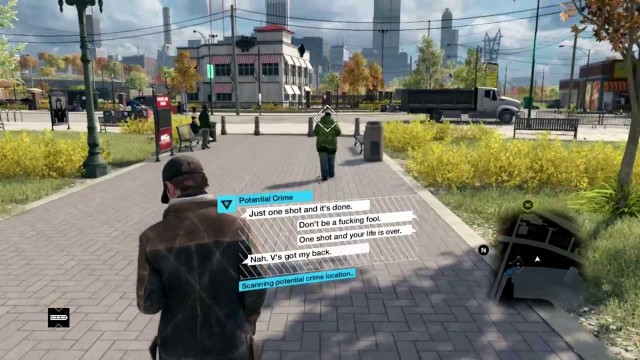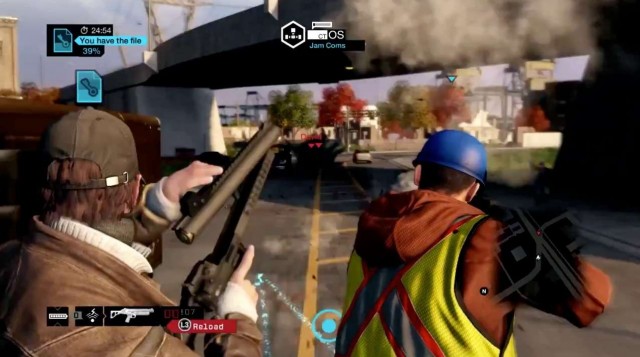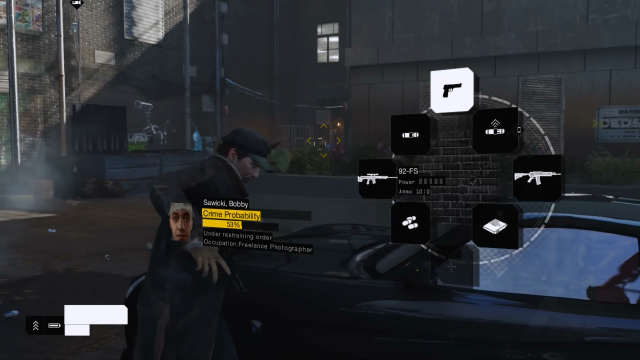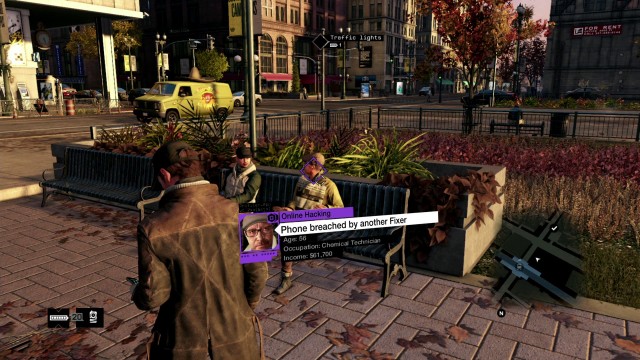Being Ubisoft’s inaugural next-gen game IP, Watch Dogs had a rather bumpy launch, especially considering the colossal hype train that Ubisoft threw behind it. After an initial delay out of the launch windows for both next-gen consoles last November, the game finally released on almost all of its platforms this past May. The only exception is the Wii U version, which only launched recently. That’s not even considering the heap of issues and controversies that the game faced, particularly in its PC version, which was virtually unplayable for the first little while of launch, making it quite a long and storied road for Watch Dogs to deliver the full experience that Ubisoft promised us.
Now that the Wii U version is finally available, and the launch issues have finally been sorted out however, it’s time to think objectively and ask; Is Watch Dogs as good as Ubisoft said it would be, now that it’s complete? Is it the gateway to a whole new gaming standard in terms of scope and innovation?
Put simply, no. Watch Dogs is essentially just another Grand Theft Auto-esque sandbox game that simply happens to have a neat hacking mechanic. It’s also a game that is very evidently perfectly possible on the last-gen Xbox 360 and PlayStation 3, even if the former more so than the latter, but we’ll get to that.
While it doesn’t feel very ‘next-gen’ though, even on PlayStation 4, Xbox One and optimal PC settings, is Watch Dogs still a good game? Certainly! In fact, it’s very enjoyable, so long as you keep your expectations in check. The game is best enjoyed on some platforms over others, with the PS3 and Wii U versions particularly suffering, and the PC version forcing you to deal with that perpetually irritating UPlay DRM nonsense, but objectively, Watch Dogs is a very good sandbox game. It’s just not as remarkably impressive as Ubisoft was likely hoping.
If you’re just looking to enjoy a fun open-world game with no shortage of compelling distractions, then Watch Dogs is well worth your time. It probably won’t blow you away though.
Watch Dogs set up quite a massive visual standard for itself after the now-infamous E3 2012 reveal came with some outstanding graphical quality, previously unheard of in the console space especially. We’ve since learned that the demo was doctored, and the actual game doesn’t look nearly as good as Ubisoft initially promised, but despite that, it’s certainly not a bad-looking game either, especially on next-gen hardware.
Again, the game averages out to looking pretty good, but not amazing by any means. The visuals are definitely at their best on high-end PC settings, and if you dig into the code, you can unlock even more graphics options that Ubisoft inexplicably disabled. Watch Dogs still doesn’t look as good as the initial E3 reveal on PC, even at the game’s max, jailbroken settings, and depending on your hardware, the 30 fps framerate may dip at times, but for a triple-A PC release in 2014, it looks plenty sharp.
In the console space, the PS4 version is visually the strongest, particularly since it runs at native 1080p resolution, and has no trouble maintaining a consistent 30fps framerate, even during hectic gunfights, chases, and crowds of NPC’s swarming the screen. The Xbox One version is mostly comparable to its PS4 counterpart, running smoothly and juggling a lot of NPC models and dynamic effects without performance issues itself, though its resolution is a bit inferior, clocking in at only around 900p, rather than full native 1080p like on PS4. It’s not noticeable if you’re a strict Xbox gamer, but if you play the PS4 version and then play the Xbox One version, you’ll see a slight dip in visual quality on Microsoft’s console.
On last-gen hardware however, the issue is flipped around. The Xbox 360 version and PS3 version both run at a downscaled 720p, and have less NPC’s wandering about Chicago compared to the PS4, Xbox One and high-settings PC versions, though the Xbox 360 version definitely renders and performs better, and more consistently between the two. The PS3 version has some serious performance issues, even if they were noticeably worse at launch, often seeing problematic lag, and a framerate that is often happy to slide below 30fps. Not only that, but the texture and model rendering is noticeably poorer on PS3 compared to Xbox 360, plus the PS3 version seems to have a unique problem with screen-tearing, even post-patching. These issues sadly make the PS3 version come off as the sloppiest, and least well-designed port of the game, and that’s a real shame for PlayStation gamers who haven’t yet upgraded their console, thus being forced to deal with a sub-par port if they want to play Watch Dogs earlier. Adding insult to injury there is the fact that the PS4 version is arguably the best of the five console builds of Watch Dogs.
Despite all that though, the porting quality of the Wii U version is almost worse, just barely squeaking ahead of the PS3 version’s lacklustre quality. On the bright side, the Wii U version of Watch Dogs looks pretty good, visually outclassing the Xbox 360 and PS3 versions to a noticeable degree, even if it’s still noticeably beneath the visual quality of the PS4, Xbox One and optimized PC versions. It lacks the screen-tearing issues on PS3 as well, but it does have the same framerate issues, seeing almost crippling lag at times. The Wii U performance is almost worse than the PS3 version’s, leaving Nintendo gamers in for an especially bumpy experience if they want to give Watch Dogs a go on the Wii U.
Watch Dogs isn’t a visual masterpiece on any platform, but it looks quite polished and well-produced on most of them. Animations, environments, vehicles, and everything else look good, and some of the little environmental touches when hacking the city do look pretty cool. It’s unfortunate then that the PS3 and Wii U versions feel sloppier in terms of their performance, and the PS3 version’s graphics are especially left wanting.
Watch Dogs contains a serviceable, techno thriller-inspired score, which is rife with synth and dramatic chords. It sounds like about what you would expect from a game like this, and it gets the job done. There’s a host of music tracks you can play from the car radio as well, and a nifty side quest that involves using a Shazam-like app called SongSneak to capture real licensed songs from around the game world. The licensed songs aren’t anything all that interesting, but again, they get the job done, and have some decent variation.
As for sound effects, they’re remarkably well-realized, and feel very authentic and powerful. The roar of a sports car engine is as satisfying to hear as it is in any sandbox game worth its salt, and the various weapons that you can wield in the game all sound weighty and satisfying to unload on your enemies. The best sound effects however are likely the sharp sounds that come with messing with the environment, such as hearing a car smash into a roadblock that you’ve raised, or rupturing a steam pipe to hear the whooshing of imminent doom for your pursuers just the same. Helpful and diverse sound cues throughout the game also help players manage the game’s sometimes-heavy flow of visual information, which might seem overwhelming at first, but it’s not long before your brain connects sounds to key events, making Watch Dogs far more accessible.
Voice acting is also pretty well-done to boot, though Aiden Pearce is a rather dull, monotone protagonist. A more interesting and diverse supporting cast helps to make the story more interesting, but Aiden himself feels like too much of a blank slate, regardless of whether players want to be a hero or a menace to Chicago. One of the game’s DLC expansions at least allows you to play as one of these more interesting supporting personalities, but if Aiden Pearce is indeed to return in another Watch Dogs game, he needs to be more interesting than just being a shadowy, brooding loner.
Beyond that though, Ubisoft has put plenty of polish into the audio, as with the visuals on next-gen hardware in particular. The use of audio for sound prompts is well done, and aside from Aiden himself, Watch Dogs‘ characters have plenty of compelling personality to bring the world to life with.
Watch Dogs plays out in a hypothetical near-future setting, whereupon the concept of mobile devices and inter-connectivity have evolved into the idea of an entire, ‘smart city’. With Chicago embracing a widespread information-regulating database called ctOS, the citizens feel safer, oblivious to the power handlers behind the scenes. That’s where hacker vigilante, Aiden Pearce comes in, who is digging into ctOS to find answers over a botched hit that led to the death of his six-year-old niece.
Comparisons to Grand Theft Auto are inevitable, and understandable in Watch Dogs. A huge open-world setting in Chicago is at your disposal from the get-go, allowing you to take on missions both optional and mandatory for various characters, with players able to steal cars, hack city infrastructure, and either menace the city with their own whims, or work to making Chicago truly become a better, safer city. If you’ve played any Grand Theft Auto game before, or anything like Grand Theft Auto for the most part, you should know plenty of what to expect with Watch Dogs already.
It would be wrong to dismiss Watch Dogs as a simple Grand Theft Auto wannabe though. The game does plenty to carve out its own distinct identity, even with the infrastructure and progression definitely being inspired by Grand Theft Auto, thanks to a nice, varied set of missions, and an effective one-button hacking mechanic that lets you tap into ctOS for your own ends. Using just one button on the controller for example, you can tweak an intersection to display all green lights, having other cars slam into vehicles pursuing you. Likewise, you can tap into mobile devices and building routers at the touch of a button, helping yourself to some money that you can handily draw from any ATM, or simply peeping at secret areas for collectibles and potentially damning information.
For the most part, it works well, and makes you feel like the city itself is your weapon. As you play on, hacking obstacles to stop pursuing vehicles becomes a bit routine, just as tracking criminals with the ctOS probing system becomes routine, always ending in the same simple foot races and melee takedowns with no variation (unless you want to shoot the crook and ding your reputation), but there’s no denying that Watch Dogs has a very cool idea behind it. It empowers you in a way that a game series like Grand Theft Auto just doesn’t, not in the same way.
The game isn’t all fast-paced chasing though. The combat veers more in the opposite direction, being more slow-paced and tactical, and emphasizing stealth much more than you would think. Even on the lowest difficulty setting, enemies can kill Aiden very quickly (almost too quickly in the more action-driven segments), so a lot of the combat involves taking cover, and getting the drop on your foes whenever possible.
This calls to mind comparisons to another Ubisoft franchise, Assassin’s Creed, albeit in the modern era. In fact, Ubisoft Montreal has drawn from the playbook of several Ubisoft franchises that they’ve worked on, making Watch Dogs feel like something of a blend of Ubisoft Montreal’s greatest hits, plus that cool hacking mechanic. The sneaking and takedowns definitely feel very Assassin’s Creed-esque, with the methodical, tactical gunplay borrowing significantly from Splinter Cell. Even the idea of activating ctOS towers to increase influence and open up side missions feels very reminiscent of Far Cry.
It all comes together to make a satisfying new whole though, even if the combat sometimes doesn’t benefit from its slow, careful pace, which leaves Aiden more easily killed than he probably should be, even if like most modern game protagonists, his health automatically regenerates if you avoid damage for a little while. Watch Dogs can get pretty challenging in some missions, since Aiden is constantly outgunned, and using the environment carefully is hugely emphasized in this game, whether for hacking, or for defense, since rushing enemies head-on will consistently leave you dead in seconds.
Fortunately, if you want to switch activities, Watch Dogs is not wanting for distractions. Outside of a good mix of driving, shooting, sneaking and hacking in the main story, a bevy of optional missions can further allow you to hone your specialties. You can intercept criminal convoys, infiltrate gang hideouts, solve environmental puzzles for collectibles, and perform driving tasks in Fixer Contracts. A cool Progression Tree also helps players easily monitor their exact progress in the game, which really helps to manage doing side content and earning trophies/achievements, and awards the player with new vehicles and weapons when they diligently explore what Chicago has to offer.
In fact, it’s the detail behind Watch Dogs that’s most impressive, even if the graphics aren’t anything revolutionary. On PlayStation 4, Xbox One and high PC settings especially, crowds of NPC’s constantly display varied and unique sets of personal information, some impressive, and some scandalous. You can also hack them with the touch of a button to listen in on their idle conversations, and get some insight into who they are. Even the bad guys have personal little details highlighted when you probe them with your reticule. It helps to give even the game’s most minor characters a dash of personality and charm that other games wouldn’t bother with, and that’s very inspired.
Even if you’d rather avoid missions, Watch Dogs offers some neat ways to unwind too. You can play chess in the park, shoot up aliens in an AR game, struggle to hit button prompts during drinking games, or enjoy a ‘Digital Trip’, which allows you to do things like stomp around Chicago in a giant spider tank. It sounds ridiculous, but it’s a great way to let loose and have some goofy fun, even if these side games don’t often carry any real rewards. It also helps the game world come to life with activities that can be as innocent as they can be deadly, helping Chicago feel that much more alive and active, even when you’re not doing missions.
There is an online component as well, though Xbox 360, PS3 and Wii U players won’t have access to all of it. Players on any platform can participate in simple online races, and can also take advantage of a rather interesting and unique mechanic that allows you to insert yourself in another player’s game, then tail them so you can hack them and install a backdoor in their phone. This leads to some strategic and often humourous ways that players must try to blend into the crowd of NPC’s, being an entertaining cat-and-mouse experience for those who are so inclined, even if its novelty does wear off after a short while. If you’d rather not have random players intruding on your experience though, don’t fret, as you can turn off online invasions in the game’s options menu, though you will need to accept them if you want every trophy/achievement.
The PS4, Xbox One and PC versions contain some unique multiplayer modes that aren’t available on last-gen consoles or Wii U as well, namely Online Decryption, which is a sort of human capture-the-flag match, where one player has to avoid being hacked by a team of opponents. It’s plenty intense and pretty enjoyable. Players on next-gen consoles and PC can also enjoy a specialized race mode whereupon they must evade the tricks and traps of another player, who can trigger cops and traps around the city using a free Watch Dogs companion app on their real-life mobile device. Again, the novelty wears off, but those who enjoy playing online will find that Watch Dogs has some clever ideas when it comes to interfacing with other players, especially on PS4, Xbox One and PC.
Regardless of your platform of choice, the game is packed with content, stretching the play value well beyond the 20-25 hour main storyline. Again though, Watch Dogs is better optimized for certain platforms over others. The PS4, Xbox One and Xbox 360 versions all seem to play very well, and have the best optimization. As mentioned, the PS3 version is sloppier, but at least it’s as mechanically sound as the other console builds, even if it forces you to put up with several unique technical problems too.
There’s some gameplay wrinkles that PC and Wii U players should be aware of though. Naturally, the PC version forces you to deal with the persistently annoying UPlay authentication to even start the game, which was largely responsible for Watch Dogs’ myriad launch issues on PC. That’s to be expected with Ubisoft games on PC, and unfortunately, Ubisoft’s reputation for badly-optimized PC ports is maintained here too, since the menus and navigation, especially with Aiden’s smartphone, are really not optimized for a mouse and keyboard. You can get around issues like this by plugging in a gamepad, but those who were hoping to take advantage of things like smoother mouse aiming are going to be pretty disappointed with the middling quality of Watch Dogs’ PC optimization.
As for the Wii U version of Watch Dogs, it lacks the ability to amass trophies/achievements naturally, which can really hurt the game’s play value after finishing the main story. The Wii U version does support the Wii U Pro Controller and off-TV play on the Wii U Gamepad on the bright side, but the only other use of the Wii U Gamepad in the game is as a simple touch map, which feels very lazy, especially considering Ubisoft’s lofty promises for Watch Dogs’ Wii U version. It is somewhat handy to be able to dynamically place map waypoints and navigate without having to interrupt the game on Wii U, but the Wii U version of Watch Dogs frequently feels like an afterthought, and one that Ubisoft largely gave up on before simply releasing in a shallow, mostly indistinct state compared to the other console versions. Needless to say, the hefty delay from May to November was not worth the wait for Nintendo gamers.
Even at its worst though, Watch Dogs is still not wanting for great variation and content. It may not be a revolutionary gameplay experience, but it’s definitely a huge one, and one that will keep players busy for quite a long time if they want to see and do everything.
Again, Watch Dogs has a very cool idea behind it, with an initially intriguing mystery that helps to see players through the majority of the main storyline. The franchise is definitely setting up a cool, interesting and unique world for the video game space, even if the payoff to its inaugural offering is a bit disappointing.
This isn’t simply due to the fact that Aiden Pearce is a boring protagonist, but also because the final motivations of the villains feel a bit shallow. Doing the side missions does help to uncover a lot of insight into what ctOS is actually for, and how it relates to a rogue hacker group called DedSec, who largely seem to exist as sequel bait, but when all is said and done, the villains of the game feel underwhelming. Their motivations are weak, and the final result of their network of lies and control feels disappointingly pedestrian for a sandbox game.
Even if the end result of all of the storytelling is kind of middling though, the game at least has a good share of cool moments, and tapping into the mystery is not without its appeal. It’s the kind of mystery that could definitely be refined and made more interesting in a sequel, but Watch Dogs’ premise is at least not wanting for creativity and social commentary.
Watch Dogs’ scale and scope is very commendable, even if it still largely feels like it’s recycling the same last-gen sensibilities that we’ve enjoyed throughout the Xbox 360/PS3 life cycle. In the end, it’s nothing that feels truly revolutionary, but it’s well-produced and jam-packed with features and content, giving players looking for a good open-world game their money’s worth, especially given more launch issues that are currently dragging down Assassin’s Creed: Unity and Far Cry 4.
The simple joy of turning a city against one’s foes is one that gets old eventually, but there’s no denying that Watch Dogs, as a potential Ubisoft franchise, is packed with promise. Some elements of the game feel like a rough draft for a truly outstanding sequel, much like the original Assassin’s Creed that arrived before the series really came into its own with Assassin’s Creed II, but the bottom line stands; Watch Dogs is fun, despite its occasional missed opportunities and design flaws, and it can also be very addictive and engrossing.
There are some worthwhile next-gen flourishes that might be worth seeking out if you already own a PS4 and/or Xbox One, with the PS4 version feeling especially polished, particularly since it and the PS3 version currently feature some exclusive bonus missions that are unavailable on other platforms, even if they’re nothing all that special or consequential. If you’re still stuck with last-gen hardware, the Xbox 360 version is perfectly recommendable and well-done, but the PS3 version’s persistent and unique technical problems make it much harder to recommend if you have any other choice, even with its exclusive bonuses. Likewise, the Wii U version of the game is clearly a slapdash afterthought that isn’t worth seeking out for Nintendo gamers, unless you’re absolutely desperate for a sandbox game, and somehow only own a Wii U. Even then, be prepared to put up with persistent and irritating lag, and virtually no effort made to take advantage of the Wii U’s unique capabilities, even if the Wii U version is at least a tad prettier than the Xbox 360 and PS3 versions.
PC gamers can rest easy now, since the slew of PC-specific launch issues for Watch Dogs now seem to be almost entirely ironed out, now making it a worthwhile purchase for those preferring to play sandbox games on their computers. The system requirements for the game are a little beefy on PC though, particularly for its merely good graphics and 30fps framerate, so console gamers probably wouldn’t find the PC version to be worth it. That’s especially true when you recall that the PC version forces you to deal with the usual UPlay annoyances, makes players jailbreak the optimal visual settings, and is noticeably poorly-optimized, especially if you don’t play with a gamepad. Frankly, it’s not quite as recommendable as the PS4 and Xbox One versions, even if dedicated PC gamers should be fine with it.
All in all though, Watch Dogs is a worthy new IP for the Ubisoft catalogue, even if not a true foray into next-gen gaming. If the game follows the development model of Assassin’s Creed and Far Cry, the sequels should hopefully take this fun foundation, and eventually build something truly wonderful with it.

